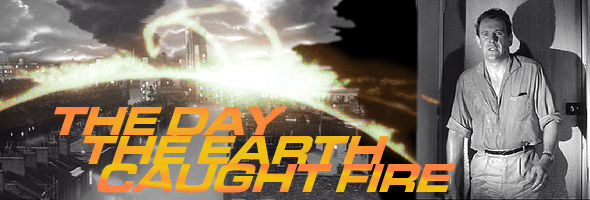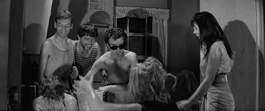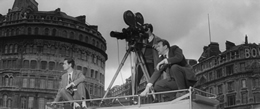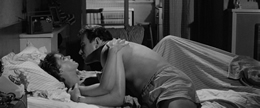
B&W/Color Tinted, 1961, 99m.
Directed by Val Guest
Starring Edward Judd, Janet Munro, Leo McKern
BFI (Blu-ray & DVD) (UK RB/R2 HD/PAL), Network (DVD) (UK R2 PAL), Lionsgate, Anchor Bay (DVD) (US R1 NTSC) / WS (2.35:1) (16:9)

B&W/Color Tinted, 1961, 99m.
Directed by Val Guest
Starring Edward Judd, Janet Munro, Leo McKern
BFI (Blu-ray & DVD) (UK RB/R2 HD/PAL), Network (DVD) (UK R2 PAL), Lionsgate, Anchor Bay (DVD) (US R1 NTSC) / WS (2.35:1) (16:9)
One of the best films Hammer Studios never made, The Day the Earth Caught Fire is an imaginative, resourceful science fiction yarn about what might happen if the Earth wound up spinning of its orbit towards the sun. Eschewing the ludicrous soap opera situations and bombastic effects that crippled efforts like Meteor and When Time Ran Out, this depiction of doomsday pulls no punches and offers no easy answers, instead leaving the viewer with an uneasy but not hopeless feeling about what might happen with each coming sunrise.
In the orange-tinted opening sequence, reporter Peter Stenning (Island of Terror's Judd) sits at a desolate counter recording for dubious posterity the story of how the world became a heat-lashed wasteland. It all began when his day-to-day job at the newspaper office was disturbed by the realization that something might be tying together an increasing number of "small" worldwide catastrophes. With the aid of a coworker (X: The Unknown's McKern) and a government worker, Jeannie (The Crawling Eye's Munro), who possesses some valuable information, Peter sets out to expose the truth to a humanity unaware of its numbered days. Apparently the simultaneous detonation of nuclear bombs by the U.S. and the Soviet Union at opposing poles on the planet has disrupted the Earth's orbital pattern, leading it on a fiery path directly to the sun. As mankind gradually descends into barbarism and panic, only one possible solution emerges...
The clever juxtaposition of black and white scope photography, restrained color tinting in bookend segments, stock footage, and resourceful special effects ably supports this surprisingly powerful storyline. The characters are all literate, interesting people, spouting out dialogue that would make Howard Hawks proud while rendering credibility to the disturbing premise (which was condensed to an equally nightmarish degree in a Twilight Zone episode, "The Midnight Sun"). Munro lingers longest in the memory thanks to some particularly sweaty scenes (indeed, this film might have held the cinematic record for perspiration before Body Heat), but everyone pulls off their parts with nary a false note. In the pantheon of British sci-fi, t his film, along with its spiritual companion pieces like the Quatermass films and Journey to the Far Side of the Sun, proves that thought provoking sci-fi doesn't have to mean dull. Finally, the last shot is, in its own lingering, unresolved way, quite perfect.
his film, along with its spiritual companion pieces like the Quatermass films and Journey to the Far Side of the Sun, proves that thought provoking sci-fi doesn't have to mean dull. Finally, the last shot is, in its own lingering, unresolved way, quite perfect.
 Long a victim of butchered pan and scan broadcasts, The Day the Earth Caught Fire (which also inspired a brilliant 1979 rock album) regained its much-needed visual sweep with a fine anamorphic transfer from the vaults of Canal Plus via Anchor Bay in the early days of DVD in 2001. Unfortunately the mono audio was a muffled, dull disaster, a fate that befell some of the label's other Studio Canal acquisitions like Dead of Night. Anchor Bay also packed the disc with enough extra goodies to make it a welcome purchase beyond the obvious pleasures of the film itself. Director Val Guest (The Abominable Snowman) contributes a fine commentary track, hosted by Ted Newsom, in which he points out many of the locales and actors used to bring verisimilitude to a story which must have seemed unbelievable at the time. Also included are a gallery of still and promotional images as well as a theatrical trailer and ragged TV spots, while the liner notes by Mark Wickum offer a sketch elaborating on Guest's place in the British sci-fi pantheon. Subsequent SD versions were later issued on DVD by Network in the UK and in the US as a manufactured-on-demand title from Lionsgate.
Long a victim of butchered pan and scan broadcasts, The Day the Earth Caught Fire (which also inspired a brilliant 1979 rock album) regained its much-needed visual sweep with a fine anamorphic transfer from the vaults of Canal Plus via Anchor Bay in the early days of DVD in 2001. Unfortunately the mono audio was a muffled, dull disaster, a fate that befell some of the label's other Studio Canal acquisitions like Dead of Night. Anchor Bay also packed the disc with enough extra goodies to make it a welcome purchase beyond the obvious pleasures of the film itself. Director Val Guest (The Abominable Snowman) contributes a fine commentary track, hosted by Ted Newsom, in which he points out many of the locales and actors used to bring verisimilitude to a story which must have seemed unbelievable at the time. Also included are a gallery of still and promotional images as well as a theatrical trailer and ragged TV spots, while the liner notes by Mark Wickum offer a sketch elaborating on Guest's place in the British sci-fi pantheon. Subsequent SD versions were later issued on DVD by Network in the UK and in the US as a manufactured-on-demand title from Lionsgate.
However, you can easily set all of those versions aside for the 2014 edition prepared by the BFI, released in separate Blu-ray and DVD editions. The new 4K transfer is a real knockout with a very vivid, filmic appearance; you can easily count the beads of sweat if you're so inclined. The LPCM mono audio sounds fantastic, leagues better than past versions; it's nice to finally have all the dialogue clear and fully intelligible. Optional English subtitles are also included. The Guest commentary, trailer, and TV spots (in far superior HD condition) are carried over here (with some radio spots to boot), but a large number of additional extras have also been added. The 34-minute "Hot Off the Press: Revisiting The Day the Earth Caught Fire" takes a look at the film's status in the country's sci-fi canon, the value of shooting the journalism scenes in and around the real Fleet Street headquarters of London's Daily Express, and the political tenor of the times courtesy of Kim Newman, Marcus Hearn, and BFI Archive curators John Oliver and Jo Botting. The film's connections to atomic scare attitudes of the time are a running through this and some of the other bonus features including a trio of vintage atomic age shorts from the BFI National Archive: 1952's Operation Hurricane (33m.), a surprisingly tense and harrowing look at a particularly ill-considered atomic detonation by British scientists and the military near Western Australia, complete with a powerful score by the great John Addison; 1956's The H-Bomb (22m.), a call to action and instructional guide for a population living in recent atomic testing days; and 1962's The Hole in the Ground (30m.), a civil defense film exploring the potential aftermath of a nuclear war in disturbing detail. There's an intriguing musical connection to the later 2001: A Space Odyssey, too. Things lighten up a bit with a quick one-minute 1978 instructional spot, "Think Bike," in which Judd appears again as a narrator. Also here and worth exploring are a different expanded poster and stills gallery, a recent audio appreciation of the film by UK critic Graeme Hobbs, a 2001 9-minute video interview with the colorful McKern about the film and his career at the time (he also appeared memorably in Help!), and most substantially, a 63-minute 1998 interview with Guest and wife Yolande Dolan conducted by David Meeker at the National Film Theatre. It's a great career overview covering his diverse body of work from Expresso Bongo to his notable Hammer work like The Quatermass Xperiment, Quatermass 2, When Dinosaurs Ruled the Earth, and The Abominable Snowman. (Not surprisingly, there's less attention given to his daffy 1970 sci-fi musical Toomorrow, which is still in dire need of a legit digital release.) A superb presentation all around.
![]()